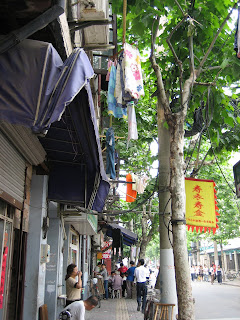Why does Puxi feel so different compared to Pudong?
While it's fun to wonder around the lively atmosperic streets of Puxi, would I really want to live there permanently?
Some of my younger colleagues love the wide open spaces and orderly streets of modern Pudong, and why not?
Many lament the loss of old shikumen (stone terrace houses) as the city modernises, and I understand their frustrations. After all, my beloved Bukit Bintang Girls' School, a beautiful century-old colonial building is now a spanking new shopping mall in Kuala Lumpur. Many developing cities often sacrifice the historical values and aesthetics at the altar of commercial development.
Romantic idealism aside however, I also identify with the aspirations of many local Chinese who want to better their lives and living conditions. After all, many of these old structures are dark, damp, musty and often not very hygienic. Why wouldn't they aspire to live in a modern apartment with electricity, running water, wireless broadband and a swimming pool? Every parent works to better the lives of their children and next generation. It's the energy that fuels evolution.
As with all things however, there is a need for balance. In our rush to modernisation, we must not lose our cultural identities and links to our roots. So, let's build our comfortable new condominiums, but let's also conserve areas of historical value so that we won't forget the sacrifice of the generations past.
After all wasn't it Sir Isaac Newton who said, "If I have seen further, it is by standing on the shoulders of giants".



No comments:
Post a Comment